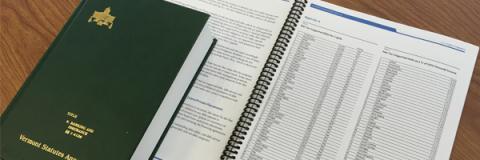Saving for retirement may be a virtue, but most who partake do so for a more prosaic reason: Their employer made it easy to sign up.
Employer-sponsored accounts are the chief way that rank-and-file workers can build a nest egg. A gulf of savings, however, separates working Vermonters who have access to an employer plan and the roughly 40 percent who don't.
The gap threatens to diminish their golden years and strain social services. State leaders have long fretted over how to close it and in 2017 devised a program to help more employers offer plans. The program failed to launch.
A new proposal currently before lawmakers involves a simpler solution that taps into the basic psychology of long-term saving. The state would create individual retirement accounts for people who don't have workplace plans and automatically sign them up for payroll deduction — unless they opt out. The bare-bones program, modeled after ones that recently debuted in several other states, could prompt tens of thousands of Vermonters to start saving, proponents say.
"It will have a big impact without having a big price tag," said state Treasurer Mike Pieciak, whose office drafted the proposal, dubbed VT Saves.
Employers cite the time, expense and liability of maintaining company plans as reasons they don't offer them. The hurdles are highest for small businesses, which account for the bulk of Vermont employers.
A state-run auto-IRA removes most of the burden from those businesses while still harnessing the power of payroll deduction. The bill authorizing VT Saves, S.135, would divert 5 percent of an enrollee's paycheck into a Roth IRA account administered by the state through a third party. The savings percentage would automatically increase by at least 1 percent annually.
Workers could adjust their contributions or decline to participate, but automatic enrollment is intended to provide a strong nudge. Only employers without company plans would be required to help their employees sign up; employers with fewer than five employees would be exempt, at least initially. A one-time appropriation of about $750,000 and small fees on participants would pay for the program, including any new state employees hired to administer it.
Roughly 88,000 Vermont workers do not have access to an employer plan, according to modeling by the AARP, which supports auto-IRA proposals. Those employees tend to earn less than $50,000 per year and are more likely to be Black. About half are under 35, according to the AARP estimate.
Most lower-wage earners are already pinching pennies. But Pieciak said even saving just enough money to delay taking Social Security payments by a couple years can represent "a pretty significant benefit." That's because monthly Social Security payments are higher for those who delay taking them as soon as they are eligible.
Workers contributing to a retirement account would also be able to take advantage of a provision in recently signed congressional legislation that creates a federal match of up to $1,000 annually, beginning in 2027.
Roth IRAs, a type of after-tax investment account, also double as emergency savings, because the principal can be withdrawn without a penalty, Pieciak noted. Individuals under 50 can contribute up to $6,500 per year in 2023, and those over 50 can set aside up to $7,500, according to Internal Revenue Service rules.
At least a dozen states are setting up auto-IRA programs similar to VT Saves, and several, including Oregon, Illinois and California, have already launched theirs.
About two-thirds of eligible workers in Oregon — 116,000 people — are actively contributing to IRAs through OregonSaves, said Michael Parker, executive director of the Oregon Treasury Savings Network. The program, rolled out in 2017, now stewards $182 million in participant assets, an average of $1,600 per account. Many of those participants had not previously saved anything for their retirement.
"We look at it as a huge success," Parker said.
Vermont formed a retirement study committee in 2014 that had pursued a different tack. The committee recommended a Green Mountain Secure Retirement Plan that would have been voluntary for businesses. It was under development from 2017 through the pandemic.
The plan promised benefits that an auto-IRA cannot, including an option for employers to provide a matching contribution. The state went so far as to sign a contract with a third-party plan administrator, but the effort has since died a quiet death. Vermont GOP chair Paul Dame, who sat on the state board overseeing the program's development, said he was unaware the treasurer's office had scrapped it. "The last I had known, we had approved some policy stuff. We had put things out for a bid," he said.
Former treasurer Beth Pearce told Seven Days that program fees proved unworkable. She said she supports the proposal that Pieciak has since put forward, which "provides a much more streamlined approach."
The Senate Committee on Economic Development, Housing and General Affairs endorsed the VT Saves bill unanimously earlier this month. Pieciak, a Democrat, along with Sens. Kesha Ram Hinsdale (D-Chittenden-Southeast) and Randy Brock (R-Franklin), unveiled the proposal at a Statehouse press conference last week in a show of bipartisan support.
"When people have more money to retire, to be able to take care of themselves, they are less dependent on government to do those things," Brock said.
It's unclear whether Gov. Phil Scott, a Republican, will support the measure. His spokesperson, Jason Maulucci, said the governor hadn't evaluated it yet "but is open to the concept if it follows an opt-in approach" — which suggests Scott might not favor the opt-out version that's been introduced.
The mandate for employers to facilitate sign-ups and the auto-enrollment feature for employees have been crucial to Oregon's success, Parker said. The state is currently rolling out the final phase of OregonSaves, for businesses with fewer than five employees. While the vast majority of businesses have been willing partners so far, the state has the power to penalize employers who neglect or refuse to participate.
Oregon allows independent contractors and certain other employees to sign up for OregonSaves on their own; only about 2,000 have done so, Parker said.
Greg Marchildon, director of AARP Vermont, sees auto-enrollment through VT Saves as a way to "really make a dent" in the Sisyphean task of convincing people to save for old age. His organization is pledging to conduct public outreach to workers if VT Saves becomes law.
Making that case to lower-wage workers will be easier, Marchildon acknowledged, when they're not being asked to do anything at all.





